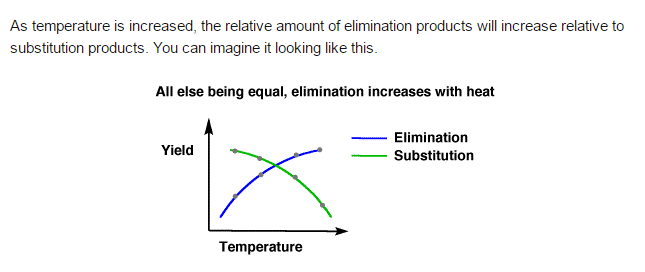This is according to my text :
Increasing temperature favours elimination over substitution. This is because energy of activation for elimination is higher than that of substitution since higher degree o charges in bonding is involved in elimination reaction. [sic!]
Well I understand why more elimination occurs at high temperatures (I guess this is due to $\Delta G$ being more negative due to multiple product formation as well), but why do substitution reactions have their yields decreased as temperature goes up?
This is according to the master of organic chemistry; (Even though it says that there is a relative increase, the graph shows a decrease in yield of the substituted products):
Aren't they supposed to have their output increased as well, as the activation energy barrier has already passed and rate increases with increase in temperature, or am I missing something fundamental here?

